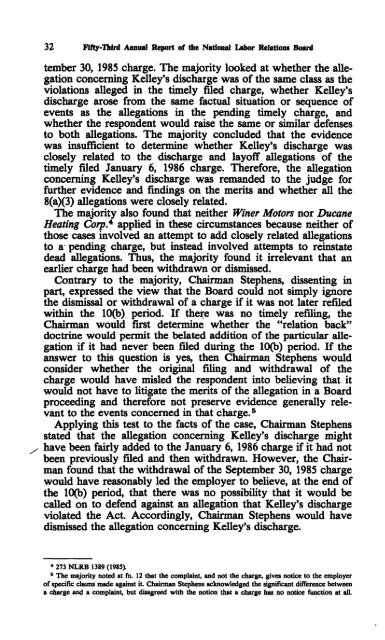Operations In Fiscal Year 1988 - National Labor Relations Board
Operations In Fiscal Year 1988 - National Labor Relations Board
Operations In Fiscal Year 1988 - National Labor Relations Board
Create successful ePaper yourself
Turn your PDF publications into a flip-book with our unique Google optimized e-Paper software.
32 Fifty-Third Annual Report of the <strong>National</strong> <strong>Labor</strong> <strong>Relations</strong> <strong>Board</strong>tember 30, 1985 charge. The majority looked at whether the allegationconcerning Kelley's discharge was of the same class as theviolations alleged in the timely filed charge, whether Kelley'sdischarge arose from the same factual situation or sequence ofevents as the allegations in the pending timely charge, andwhether the respondent would raise the same or similar defensesto both allegations. The majority concluded that the evidencewas insufficient to determine whether Kelley's discharge wasclosely related to the discharge and layoff allegations of thetimely filed January 6, 1986 charge. Therefore, the allegationconcerning Kelley's discharge was remanded to the judge forfurther evidence and findings on the merits and whether all the8(a)(3) allegations were closely related.The majority also found that neither Winer Motors nor DucaneHeating Corp.4 applied in these circumstances because neither ofthose cases involved an attempt to add closely related allegationsto a- pending charge, but instead involved attempts to reinstatedead allegations. Thus, the majority found it irrelevant that anearlier charge had been withdrawn or dismissed.Contrary to the majority, Chairman Stephens, dissenting inpart, expressed the view that the <strong>Board</strong> could not simply ignorethe dismissal or withdrawal of a charge if it was not later reffiedwithin the 10(b) period. If there was no timely refiling, theChairman would first determine whether the "relation back"doctrine would permit the belated addition of the particular allegationif it had never been filed during the 10(b) period. If theanswer to this question is yes, then Chairman Stephens wouldconsider whether the original filing and withdrawal of thecharge would have misled the respondent into believing that itwould not have to litigate the merits of the allegation in a <strong>Board</strong>proceeding and therefore not preserve evidence generally relevantto the events concerned in that charge.5Applying this test to the facts of the case, Chairman Stephensstated that the allegation concerning Kelley's discharge mighthave been fairly added to the January 6, 1986 charge if it had notbeen previously filed and then withdrawn. However, the Chairmanfound that the withdrawal of the September 30, 1985 chargewould have reasonably led the employer to believe, at the end ofthe 10(b) period, that there was no possibility that it would becalled on to defend against an allegation that Kelley's dischargeviolated the Act. Accordingly, Chairman Stephens would havedismissed the allegation concerning Kelley's discharge.4 273 NLRB 1389 (1985).'The majority noted at fn. 12 that the complaint, and not the charge, gives notice to the employerof specific claims made against it. Chairman Stephens acknowledged the significant difference betweena charge and a complaint, but disagreed with the notion that a charge has no notice function at all.
















